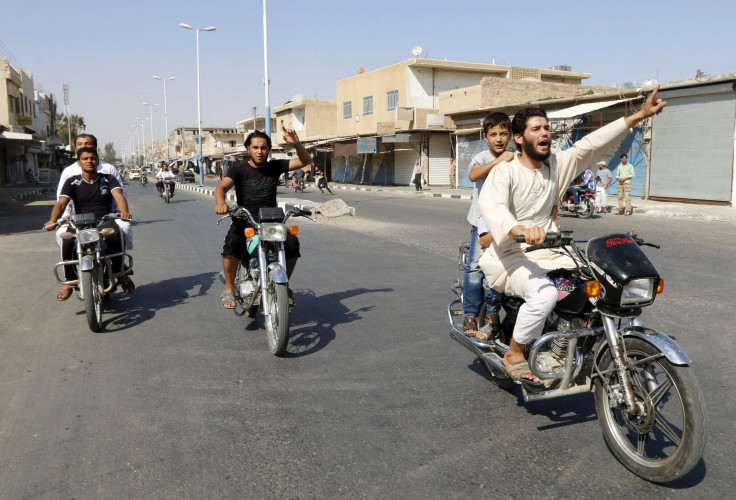How To Make Friends And Defeat ISIS: Form A Regional Coalition With Your Enemies
The Islamic State’s rise this summer led to some peculiar alliances. Regional powers like Saudi Arabia, Iran and Iraq have started to ignore historical grudges and their individual enemies in order to form a unified front against the Islamic State. Rebel leaders are also combining their efforts. For the past year, rebel factions in the region, including some designated terrorist organizations, have been pledging allegiance to the Islamic State, or the militant group formerly known as ISIS.

President Barack Obama said Thursday the U.S. had no strategy for invasion in Syria, while also stressing the importance of bolstering “moderate” Sunni leaders to create a regional anti-ISIS coalition. “We're going to cobble together the kind of coalition that we need for a long-term strategy as soon as we are able to fit together the military, political and economic components of that strategy," Obama said.
ISIS is also building a coalition. The al Qaeda affiliate in Tunisia, Ansar al-Sharia, and Lebanese militants, Free Sunnis of Baalbek Brigade, have pledged their loyalty to ISIS in recent weeks. Last week, the major terrorist group al Qaeda in Yemen announced their solidarity with ISIS, even though al Qaeda leader Ayman al-Zawahiri disentangled himself from ISIS earlier this year.
Tensions hit a high point when ISIS declared in early June its own caliphate, blurring the border between Syria and Iraq and threatening to do the same across the region. Rather than wait for ISIS to change the landscape of the Middle East, regional powers blurred their own lines of allegiance by coming to the rescue of groups they once saw as enemies. This widespread shift in loyalty, specifically with regards to Saudi Arabia, the U.S and Iran, underscores the severity of the ISIS threat.
Islamic State set its sights on eliminating the Kurdish population of Iraq earlier in the summer, resulting in a U.S. aerial operation targeting ISIS strongholds there. The U.S. has a historically positive relationship with the Kurds and that move was expected. What was unexpected is that both the Iraqi government and the Kurdish regional government asked for U.S. help. Two years ago, the Iraqi government would not have been so quick to back the Kurds. The two groups have been in a power struggle in Iraq for years over control of oil fields, territory and politics. The Kurds have their own military, govern their own territory and refuse to cede control to the Iraqi government.
In an even less predictable turn of events, the Iranian government also offered to help the Iraqi Kurds and sent weapons to Kurdish fighters this week, effectively aligning Iran’s goals with U.S. goals. For Iran, previous allegiances have been rooted in religion. When ISIS first seized parts of Iraq, Shiite-dominated Iran supplied the Shiite Iraqi government with drones and military equipment. The Kurds, however, do not have many qualities that would make them appealing to Iran: they are a largely Sunni population with their own language and are not considered to be “Arab.”
Iran’s Kurdish population has faced terrible prosecution throughout history. Iran, however, would seemingly rather deal with the existence of Kurds then eventually have to fight ISIS in Iran, which may not be that far off. In recent months, a video on al-Furqan media titled “Changing of the Swords” reported that the Iranian extremist group Ansar al-Furqan had pledged allegiance to the Islamic State.
Saudi Arabia is also vulnerable to an ISIS infiltration. From a purely sectarian perspective, Saudi Arabia and ISIS should have the same enemies. They both share a supremely strict interpretation of Sunni Islam and Saudi is home to the holiest sites for Muslims, which ISIS has its sights on. But Saudi isn’t big enough for both of them and its leaders have recently called for the eradication of ISIS. Earlier this month, Saudi Arabia donated $100 million to the United Nations to help combat terrorism. More recently, the Grand Mufti of Saudi Arabia, the nation's top religious leader, called ISIS the “No. 1 enemy of Islam.”
The anti-ISIS coalition is not as straightforward when it comes to defeating ISIS in Syria. Critics say intervention in Syria would force the U.S. and regional powers to decide whether eliminating ISIS is more important than making sure President Bashar Assad does not win that nation's ongoing civil war. This used to be an obvious choice before ISIS began seizing large portions of Iraq and Syria this summer. But as individual rebel groups join forces under the ISIS flag, governments in the region are increasingly worried the Islamic State will become the new Assad.
© Copyright IBTimes 2025. All rights reserved.






















